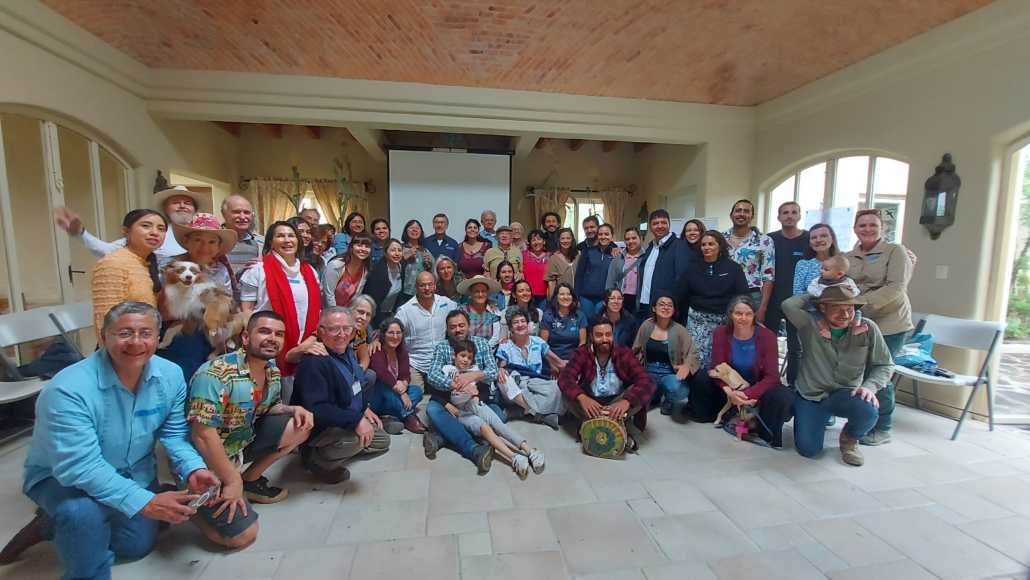Diez años en defensa de la milpa, los maíces nativos y la biodiversidad mexicana
Este pasado 5 de julio se festejaron 10 años en México de una demanda colectiva ciudadana contra el Maíz Transgénico que ha permitido defender la biodiversidad cultural de las generaciones presentes y futuras en el centro de origen.
Un colectivo conformado por 53 personas y 22 organizaciones civiles de comunidades campesinas, apicultoras, originarias, artísticas, chefs, defensoras del medioambiente y de derechos humanos, todas consumidoras de maíz, lograron detener 79 permisos para la siembra de maíz transgénico de forma comercial en el norte del país, a punto de ser otorgados por el gobierno de Enrique Peña Nieto.
Un avance estratégico fue el otorgamiento de una medida cautelar en septiembre de 2013 que impide la siembra comercial de maíz genéticamente modificado, fortaleciendo el fondo de la demanda, que no pretende una ganancia económica, sino que se nieguen de forma definitiva los permisos para la liberación o siembra de maíz transgénico en el país y que los juzgados prohiban definitivamente la siembra de maíces geneticamente modificados en el centro de origen y diversificación permanente.
Pese a más de 100 impugnaciones de las empresas, la medida cautelar fue ratificada por la Suprema Corte de Justicia de la Nación en agosto de 2021, reconociendo la importancia de mantener y preservar la biodiversidad cultural a través de las 64 razas y miles de variedades de maíces que, aparte de ser la base de más de 600 platillos y bebidas, forma parte de la integralidad de tradiciones, cultura, ritos y celebraciones en México.

Este hecho constituye una de las mayores victorias en defensa de la soberanía agroalimentaria no sólo para México, sino para el mundo. Imagen un día, sólo un día sin maíz, sin atole, tamales, tortillas, gorditas, sopes, tlacoyos, tacos, tlayudas, palomitas de maíz, huaraches, chileatole, elotes, sería una verdadera tragedia.
Por ello, en estos 10 años debemos congratularnos por la gran victoria internacional que representa haber detenido a poderosas empresas transnacionales como Bayer-Monsanto, Syngenta, Dow Agrosciences y PHI México (conocida como DuPont-Corteva), junto con Sagarpa y Semarnat, autoridades que eran cómplices hace una década, sin importarles la contaminación de los maíces nativos, ni la letalidad de su herbicida glifosato, cuyos daños han sido documentados por decenas de investigaciones científicas sin conflicto de interés; daños evidenciados por más de 100 mil demandas contra Bayer-Monsanto en Estados Unidos por los daños que causa el glifosato, sobre todo por generar cáncer.
Desde la demanda colectiva contra el maíz transgénico decimos que no es posible la “coexistencia” de maíz transgénico con maíz campesino, de acuerdo a investigaciones en otras naciones que demuestran que donde se siembran transgénicos hay contaminación por el polen llevado por el viento o por la acción de insectos polinizadores. Legalizar la siembra promovería esa contaminación que amenaza directamente la biodiversidad y el patrimonio genético agrícola más importante de México, legado por los millones de campesinos e indígenas que lo crearon y lo siguen manteniendo.

Es importante señalar que al ser el cereal más importante en el mundo por su volumen de produccion, versatilidad en usos y adaptabilidad a condiciones climáticas muy diversas, el maíz se ha convertido en un botin para esas empresas, un negocio sumamente jugoso que sin el decreto presidencial, para el año 2025 hubiera implicado la importación de 39 millones de toneladas de maíces amarillos de Estados Unidos, más del 90% GM, lo que hubiera redituado una ganancia de 2,200 millones de dólares anuales; además de la contaminación de nuestros maíces nativos.
Un negocio jugoso que están perdiendo gracias a una década de lucha y resistencia por una comunidad que defiende las semillas libres, diversas y resilientes del maíz y los productos de la milpa, que busca una agricultura ecológica para combatir el cambio climático, defender y preservar así como la comida tradicional, el agua, la tierra y los polinizadores.
La guerra se recrudece desde varios frentes atacando a la demanda, al decreto presidencial para dejar de importar gradualmente glifosato y proteger a los maíces nativos, así como por obstaculizar leyes para conservar el maíz y promover la soberanía alimentaria -desde el titular de la Secretaría de Agricultura y el Consejo Nacional Agropecuario aliado de las grandes transnacionales-; pero también es importante destacar que continúan y crecen muchas resistencias, como la “moratoria popular” de no permitir transgénicos en los campos y mesas.
Sobre todo, destaca la resistencia activa de las comunidades campesinas y originarias que pese a todo, siguen produciendo milpa y maíces permitiendo que continúe la riqueza de este gran acervo biogenético. Comunidades que han permitido que la milpa, tradición milenaria siga viva, como un modelo de ciencia campesina que es parte de la solución, a través de modelos regenerativos, ante la crisis planetaria actual.
El número 10 es sagrado en diversas culturas y comunidades, tal y como lo sostenía Pitágoras, para quien representaba la acción apoyándonos en lo aprendido. Esperemos que en estos 10 años continuemos atrayendo felicidad, abundancia y, sobre todo alcanzar nuestra meta de que la autoridad judicial declare que la liberación de maíces transgénicos daña el derecho humano a la diversidad biológica de los maíces nativos de las generaciones actuales y futuras, así como los derechos a la salud.
Queda aún un largo camino para lograr la prohibición definitiva de la siembra de maíz GM en México, para proteger la conservación y diversificación de los maíces nativos, de la milpa, de los derechos de los pueblos originarios y campesinos, así como del derecho a un medio ambiente sano y demás derechos conexos. La sentencia y la Medida Precautoria tendrán implicaciones trascendentales para la Colectividad de 125 millones de personas consumidoras, que defienden los derechos a la biodiversidad de maíces nativos y a un ambiente sano, sin los cuales no pueden garantizarse la soberanía alimentaria ni la protección de la salud.



 The image above is of a rat with large mammary tumors due to consuming glyphosate at the usual levels found in food. The tumors on the right-hand side, starting from the top, result from just eating GMO corn, GMO corn with Roundup, and just Roundup. Source: Séralini et al.
The image above is of a rat with large mammary tumors due to consuming glyphosate at the usual levels found in food. The tumors on the right-hand side, starting from the top, result from just eating GMO corn, GMO corn with Roundup, and just Roundup. Source: Séralini et al.










